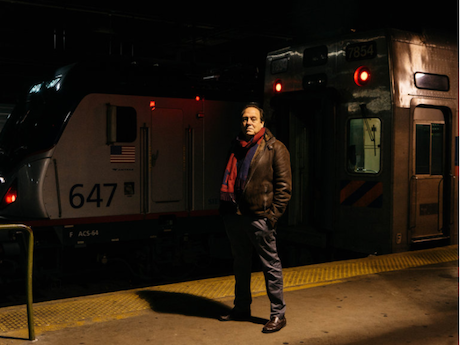In Ken Ludwig’s ‘Murder on the Orient Express,’ a Dead Man and a Writer on the Rails
By Eric Grode for The New York Times
Comparisons to the Orient Express don’t necessarily favor the 8:22 a.m. Amtrak from Trenton to Washington. Its food offerings one recent morning included Lipton tea and a shrink-wrapped blueberry muffin, not cognac and “delicate cream cheese.” And the names of the cities whizzing by — Baltimore and Wilmington, Del. — didn’t have the same ring as Konya or Vinkovci.On the other hand, nobody was stabbed to death.
Ken Ludwig had switched from one train to the other, as he had so many recent mornings. Rehearsals were in full swing for his 24th play, an adaptation of Agatha Christie’s “Murder on the Orient Express” that begins previews March 14 at the McCarter Theater in nearby Princeton, N.J., and Mr. Ludwig was heading home for a breather.
Many playwrights would have had a much shorter commute: Trenton is just over an hour from New York Penn Station. But Mr. Ludwig, a former corporate lawyer who took a leave of absence to make his Broadway debut with “Lend Me a Tenor,” has never lived in New York. Instead he lives three blocks away from his brother, just north of Georgetown.
“I had kind of a screwy past,” Mr. Ludwig said after storing his carry-on bag. “But if I hadn’t done it the way I did, I might not have felt that cocoon of safety and never written.”
Literary mysteries are nothing new for Mr. Ludwig, who has written two plays involving Sherlock Holmes. But fittingly for someone who followed up “Tenor” with a similarly farcical “Crazy for You” libretto (and received Tony Award nominations for both), he can’t resist sneaking a few laughs into Hercule Poirot’s sleuthing.
“I think the genres of comedy and mystery have a lot in common,” Mr. Ludwig said, citing the Canadian literary theorist Northrop Frye. (Like a lot of farceurs, Mr. Ludwig has a rather wide scholarly streak.) “Both start with the puzzle assembled, and suddenly the pieces are taken apart and thrown into the air. And then they finally come down, and all is well.”
For “Orient Express,” Mr. Ludwig has removed some of those pieces, winnowing Christie’s original 12 murder suspects down to eight, which he said makes it more manageable in terms of staging. He said the producers plan to “give it a chance to breathe” until a starry (and unrelated) film version comes out in November, then gauge the marketability of a New York production.
Agatha Christie’s estate has kept a fairly tight grip on “Orient Express,” only recently authorizing a stage adaptation after decades of refusals, Mr. Ludwig said.. Emily Mann, the artistic director at the McCarter and the director of Mr. Ludwig’s adaptation, said diplomatically, “It is an engaged estate.”
This level of scrutiny is something of a departure for Mr. Ludwig, whose adaptations (the Holmes plays, “The Three Musketeers,” a “Robin Hood” at the Old Globe Theater in San Diego in July) tend to be beloved titles that are in the public domain. The result is a catalog that gets produced constantly — second only to Neil Simon’s in 2016 among living playwrights, according to Samuel French — but flies somewhat under the radar in New York.“
At this stage, I have a good idea of where these plays could go,” he said. In other words, not all of them are destined for New York, something that doesn’t seem to bother him in the least.
The producer Matthew Rego, whose Araca Group produced the 2010 Broadway revival of “Lend Me a Tenor,” called Mr. Ludwig “a smart, savvy guy,” adding, “He understands the marketplace, and by creating content for that marketplace, he gets done everywhere.
”That includes high school theaters, for which he specifically wrote the Shakespeare-meets-Snooki mash-up “Midsummer/Jersey” in 2011. This was a special treat for Mr. Ludwig, who memorized the LP of Richard Burton’s “Hamlet” at the age of 10 and more recently wrote the book “How to Teach Your Children Shakespeare.”
To hear his collaborators describe him, there are a lot of special treats. “I’ve never seen a grown man so delighted,” said Ms. Mann, who previously presented Mr. Ludwig’s “Baskerville” (one of those Sherlock Holmes plays) and the “Tenor” sequel “A Comedy of Tenors” at the McCarter.
“You have no idea how old he is when you’re with him,” she said. “He has a young spirit.”
Mr. Ludwig is also not one to rest: The next piece on his horizon — “The Gods of Comedy,” in which Dionysus and Thalia visit a modern-day classics scholar — is finished as well, freeing Mr. Ludwig to take on yet another play, an autobiographical piece about his parents’ whirlwind courtship during World War II.
It helps that Mr. Ludwig, who started out waking up at 4 a.m. every day to write for four hours before heading to work at the law firm, has never been in the habit of waiting for the muse to strike.
“I love the idea of being a working playwright,” he said. “I think it’s telling that that word is spelled ‘wright,” like a wheelwright or a shipwright. Those are people who make things. I make plays.”


